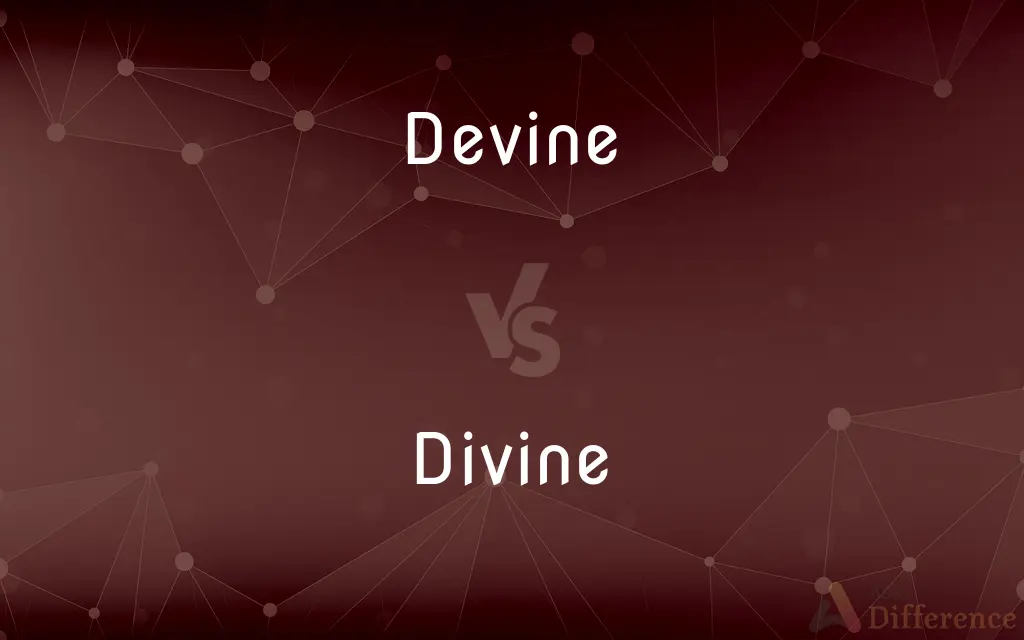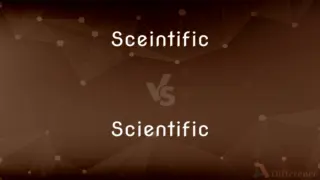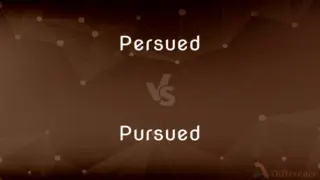Devine vs. Divine — Which is Correct Spelling?
Edited by Tayyaba Rehman — By Fiza Rafique — Updated on March 24, 2024
"Devine" is an incorrect spelling. The correct spelling is "Divine," which pertains to gods or deities.

Table of Contents
Which is correct: Devine or Divine
How to spell Divine?

Devine
Incorrect Spelling

Divine
Correct Spelling
ADVERTISEMENT
Key Differences
Relate "Divine" to "divinity," the state of being divine.
"Devine" may remind you of "device," but deities are "Divine."
Imagine the heavens with an "I" for "Divine."
Think of the 'i' in "Divine" as representing the "eye" of a deity.
"Divine" has the word "vine" in it, like a heavenly vine.
ADVERTISEMENT
How Do You Spell Divine Correctly?
Incorrect: They sought devine guidance before making the decision.
Correct: They sought divine guidance before making the decision.
Incorrect: He hoped for a devine sign to show him the way.
Correct: He hoped for a divine sign to show him the way.
Incorrect: The view from the mountain was simply devine.
Correct: The view from the mountain was simply divine.
Incorrect: She believed her success was due to her devine intervention.
Correct: She believed her success was due to her divine intervention.
Incorrect: The recipe called for a touch of devine inspiration.
Correct: The recipe called for a touch of divine inspiration.
Divine Definitions
Related to gods or a deity; heavenly.
The divine intervention saved them.
Extremely good or unusually lovely.
The cake tasted divine.
Pertaining to theology or religious study.
He pursued divine studies.
Having the nature of or being a deity.
Of, relating to, emanating from, or being the expression of a deity
Sought divine guidance through meditation.
Being in the service or worship of a deity; sacred.
Superhuman; godlike.
Supremely good or beautiful; magnificent
A divine performance of the concerto.
Extremely pleasant; delightful
Had a divine time at the ball.
A cleric.
A theologian.
To foretell, especially by divination.
To guess or know by inspiration or intuition
Somehow divined the answer despite not having read the assignment.
To locate (underground water or minerals) with a divining rod; douse.
To practice divination.
To guess.
Of or pertaining to a god.
Eternal, holy, or otherwise godlike.
Of superhuman or surpassing excellence.
Beautiful, heavenly.
(obsolete) Foreboding; prescient.
Immortal; elect or saved after death
Relating to divinity or theology.
One skilled in divinity; a theologian.
A minister of the gospel; a priest; a clergyman.
(often capitalized, with 'the') God or a god, particularly in its aspect as a transcendental concept.
(transitive) To foretell (something), especially by the use of divination.
(transitive) To guess or discover (something) through intuition or insight.
(transitive) To search for (underground objects or water) using a divining rod.
To render divine; to deify.
Of or belonging to God; as, divine perfections; the divine will.
Proceeding from God; as, divine judgments.
Appropriated to God, or celebrating his praise; religious; pious; holy; as, divine service; divine songs; divine worship.
Pertaining to, or proceeding from, a deity; partaking of the nature of a god or the gods.
Godlike; heavenly; excellent in the highest degree; supremely admirable; apparently above what is human. In this application, the word admits of comparison; as, the divinest mind.
A divine sentence is in the lips of the king.
But not to one in this benighted ageIs that diviner inspiration given.
Presageful; foreboding; prescient.
Yet oft his heart, divine of something ill,Misgave him.
To foresee or foreknow; to detect; to anticipate; to conjecture.
A sagacity which divined the evil designs.
To foretell; to predict; to presage.
Darest thou . . . divine his downfall?
To use or practice divination; to foretell by divination; to utter prognostications.
The prophets thereof divine for money.
To have or feel a presage or foreboding.
Suggest but truth to my divining thoughts.
To conjecture or guess; as, to divine rightly.
Terms referring to the Judeo-Christian God
A clergyman or other person in religious orders
Perceive intuitively or through some inexplicable perceptive powers
Search by divining, as if with a rod;
He claimed he could divine underground water
Emanating from God;
Divine judgment
Divine guidance
Everything is black1 or white...satanic or godlyt
Resulting from divine providence;
Providential care
A providential visitation
Being or having the nature of a god;
The custom of killing the divine king upon any serious failure of his...powers
The divine will
The divine capacity for love
'Tis wise to learn; 'tis God-like to create
Devoted to or in the service or worship of a deity;
Divine worship
Divine liturgy
Appropriate to or befitting a god;
The divine strength of Achilles
A man of godlike sagacity
Man must play God for he has acquired certain godlike powers
Of such surpassing excellence as to suggest divine inspiration;
Her pies were simply divine
The divine Shakespeare
An elysian meal
An inspired performance
To guess or foresee through intuition.
She could divine his intentions.
Being in the service or worship of a deity.
A divine mission.
Divine Meaning in a Sentence
His talent for music seemed to be a divine gift.
She always believed in divine intervention in times of trouble.
The concept of divine right was used to justify the authority of kings.
The choir's voices sounded almost divine in the cathedral.
She felt a divine presence in the peaceful garden.
The festival celebrated the divine aspects of nature.
They prayed for divine guidance in finding a solution.
Divine wisdom is often sought in times of uncertainty.
The beauty of the sunset was nothing short of divine.
Many cultures have myths about divine beings who created the world.
The priest spoke of the divine love that encompasses all beings.
In ancient Greece, oracles were believed to convey divine messages.
Scholars have debated the concept of divine justice for centuries.
The book described a journey towards divine enlightenment.
The ancient temple was dedicated to a divine deity.
They offered prayers to seek divine blessings for the harvest.
Their love was described as divine, transcending all obstacles.
Artists often seek divine inspiration for their work.
He shared stories of divine miracles that strengthened their faith.
They believed the natural disaster was a sign of divine wrath.
Her patience with the children was truly divine.
The divine aroma of the freshly baked bread filled the kitchen.
The divine landscape of the mountains took their breath away.
The community gathered to worship and celebrate the divine.
Divine intervention was credited for their miraculous escape.
Divine Idioms & Phrases
Divine wisdom
Knowledge or insight believed to come from a divine source.
The elders were respected for their divine wisdom on spiritual matters.
Divine right
The belief that a monarch's authority comes directly from God.
Kings often claimed divine right as the justification for their rule.
Divine guidance
Help or direction from a divine source.
Before making any major decisions, she sought divine guidance through prayer.
Divine plan
The belief that there is a deity-designed purpose for everything.
Despite the hardships, they trusted in the divine plan for their lives.
Divine protection
Safety and shielding believed to be provided by a divine power.
They prayed for divine protection during their journey.
Divine intervention
A supernatural force intervening in human affairs.
They believed their survival of the accident was due to divine intervention.
Divine presence
The belief in the omnipresence of a divine entity.
In times of loneliness, he felt comforted by the divine presence he believed in.
Divine healing
The act of curing diseases or injuries by divine intervention.
Stories of divine healing are common in many religious traditions.
Divine love
Unconditional love believed to be from or like that of a deity.
The sermon spoke of divine love as the ultimate form of affection.
Divine law
A set of laws believed to be given by God.
Many societies base their moral codes on what they consider to be divine law.
Divine punishment
Suffering or hardship believed to be a direct consequence of wrongdoing, as inflicted by a divine power.
Ancient myths often depict divine punishment for hubris.
Divine decree
An order or command believed to come directly from a deity.
The divine decree was said to have initiated the creation of the universe.
Divine wrath
Anger or punishment from a deity in response to human sin or disobedience.
The floods were once seen as a sign of divine wrath against corruption.
Divine favor
Approval or blessing from a deity.
Ancient leaders often claimed to have divine favor as legitimization of their power.
Divine justice
The ideal of fairness and justice administered by or in accordance with the will of a deity.
Believers often turn to the concept of divine justice when seeking solace in difficult times.
Divine inspiration
The influence of a deity on creators and artists.
She attributed her most profound works to divine inspiration.
Divine being
A deity or godlike figure.
The temple was built to honor a divine being who was the protector of the city.
Divine grace
A free and unearned favor from a deity, often associated with forgiveness and salvation.
She spoke of experiencing divine grace in her moment of deepest despair.
Divine mission
A special task or purpose believed to be assigned by a deity.
He felt his work with the underprivileged was part of his divine mission.
Divine revelation
The act of a deity revealing knowledge or information to humans.
The sacred texts are considered to be written under divine revelation.
Common Curiosities
Which vowel is used before Divine?
"A" as in "a divine experience."
What is the verb form of Divine?
"To divine."
What is the singular form of Divine?
Divine.
What is the pronunciation of Divine?
/dɪˈvaɪn/.
What is the root word of Divine?
"Deus," Latin for "god."
Which conjunction is used with Divine?
Any conjunction can be used depending on the sentence.
Why is it called Divine?
Derived from Latin "divinus," relating to a deity.
What is the plural form of Divine?
Divines (when referring to clergy).
Is Divine a noun or adjective?
It can be both, depending on context.
Is Divine a negative or positive word?
Generally positive, but context can change this.
Which article is used with Divine?
"A" or "the" depending on context.
Is Divine an adverb?
No.
Which preposition is used with Divine?
"Of" as in "Word of the Divine."
Is Divine a vowel or consonant?
"Divine" is a word, containing both vowels and consonants.
What is a stressed syllable in Divine?
The second syllable, "vine."
What part of speech is Divine?
Adjective or noun, depending on context.
What is the opposite of Divine?
Mortal or worldly.
Which determiner is used with Divine?
Determiners like "this," "that," "my," or "her" can be used.
What is the first form of Divine?
Divine (when used as a verb).
Is Divine an abstract noun?
Yes, when referring to the concept of divinity.
Is the Divine term a metaphor?
It can be used metaphorically in literature or conversation.
How do we divide Divine into syllables?
Di-vine.
How many syllables are in Divine?
Two syllables.
What is another term for Divine?
Godly or celestial.
What is the third form of Divine?
Divined.
Is Divine a countable noun?
Not when referring to the concept of divinity. Yes when referring to divine individuals (e.g., priests).
Is Divine a collective noun?
No.
Is the word Divine imperative?
No.
Is the word Divine a gerund?
No.
Is the word “Divine” a Direct object or an Indirect object?
It can function as a direct object, e.g., "She seeks the divine." Context determines its function.
What is the second form of Divine?
Divined.
How is Divine used in a sentence?
"Many believe in divine providence guiding their paths."
Share Your Discovery

Previous Comparison
Sceintific vs. Scientific
Next Comparison
Persued vs. PursuedAuthor Spotlight
Written by
Fiza RafiqueFiza Rafique is a skilled content writer at AskDifference.com, where she meticulously refines and enhances written pieces. Drawing from her vast editorial expertise, Fiza ensures clarity, accuracy, and precision in every article. Passionate about language, she continually seeks to elevate the quality of content for readers worldwide.
Edited by
Tayyaba RehmanTayyaba Rehman is a distinguished writer, currently serving as a primary contributor to askdifference.com. As a researcher in semantics and etymology, Tayyaba's passion for the complexity of languages and their distinctions has found a perfect home on the platform. Tayyaba delves into the intricacies of language, distinguishing between commonly confused words and phrases, thereby providing clarity for readers worldwide.







































